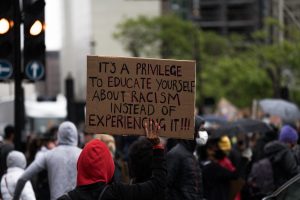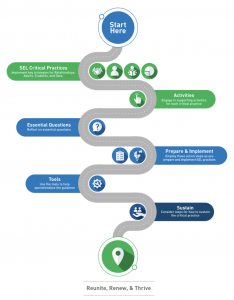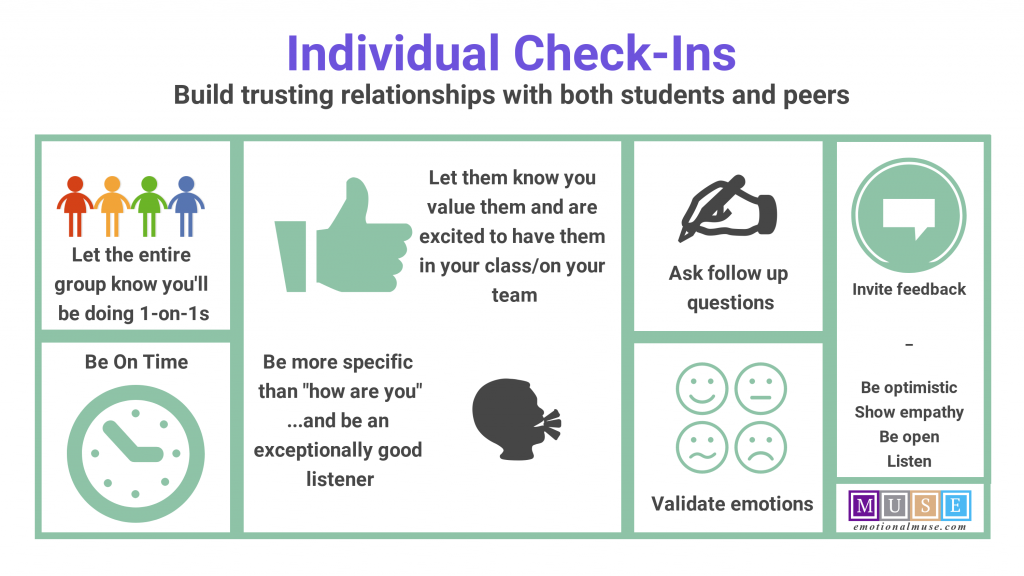TL;DR:
- Build trusting relationships at all levels of your school community by creating safe relationships for students, establishing advisory programs, encouraging parent volunteers, and checking in with teachers.
- Improve emotional health by starting each day with a welcoming or inclusion activity, embedding engagement strategies, and end with an optimistic closing and time for reflection.
Every person in this country has in some way been affected by the compounding catastrophes that have come with COVID-19. We have all had to cope with some combination of school closures, physical health crises, mental and emotional health crises, grief, loss, trauma, changing routines, loss of relationships, loss of childcare, economic strain, and the awakening of the Black Lives Matter movement.
Because of this, every member of our school communities—students, families, teachers, administrators, and community partners—have all been impacted in significant ways. Many schools are aware of this and have placed their focus this fall on social-emotional health. As founder of the MUSE Framework for Social and Emotional Learning (SEL), this is definitely the silver lining in the storm cloud hovering over our country right now for me.
However, while many schools are stating their intention of including more SEL, they are also already hitting upon obstacles. One obstacle is connecting to and creating safe places for students through remote learning. Another is that many educators are not adequately trained, and are misusing SEL to “fix” behavioral issues, rather than placing an emphasis on relationship building.
In order to create a safe, supportive, restorative, and equitable environment for all, educators will need to focus on student needs for belonging and community. Share on XBuilding Trusting Relationships: Create Safe Environments for Students

According to the Collaborative for Academic, Social, and Emotional Learning (CASEL), taking time to “cultivate and deepen relationships, build partnerships, and plan SEL” should be the focus of every educator in every school across the country. It is critical that schools develop safe, supportive, and healing environments for all members of the school community, including both teachers and students.
It is also imperative that every member of these communities feels they have a voice, and that their voice matters. The BLM movement has taught us that this also means ensuring that people of color are given equitable participation in their own and their children’s education. CASEL recommends paying extra attention to factors such as “access to technology, historical experiences with and perceptions of safety, language barriers, time and scheduling demands, and multiple social networks.”
In order to create a safe, supportive, restorative, and equitable environment for all, educators will need to focus on student needs for belonging and community. One activity my teenager did at school was a journal activity in which students brainstormed and wrote about the various communities to which they belong. This included communities based on exterior connections such as school, family, and friendships, as well as communities based on internal identifiers, such as interests, sexuality, and race. These types of simple activities not only increase SEL skills, such as self-awareness, but also allow teachers to identify students who are at risk due to their lack of belonging.
Building Trusting Relationships: Advisory Programs
Another schoolwide change many districts are undergoing is the addition of (or alterations to) an advisory program. The Harvard Graduate School of Education says, “There may be nothing more important in a child’s life than a positive and stable relationship with a caring adult. For students, a positive connection to at least one school adult — whether a teacher, counselor, sports coach, or other school staff member — can have tremendous benefits that include reduced bullying, lower drop-out rates, and improved social-emotional capacities.”
The Making Caring Common project has released a virtual version of their relationship mapping strategy for ensuring every child has at least one trusted adult at school to provide support each day.

Within the classroom, teachers can help students towards improved emotional health by following CASEL’s roadmap for reopening schools. This plan recommends starting each day with a welcoming, inclusion activity, routine, or ritual. Morning meetings have been a long-standing favorite of many elementary school teachers.
Second, CASEL recommends embedding engagement strategies, such as Think-Ink-Pair-Share, mindful minute brain breaks, and time for private thinking (teacher waits).
Third in the roadmap is an optimistic closing. “The closing activity may be reflective of the learning, help identify next steps, or make connections to one’s own work,” writes CASEL.
Lastly, include time for reflecting on a closing question. Some examples include: “I’m eager to learn more about…” or “What are my next steps?” If short on time, exit slips are an efficient way to include this last component.
Building Trusting Relationships: Two-Way Communication
One strategy to ensure a better understanding of each family’s unique needs is to open avenues for two-way communication. Rather than the traditional dynamic of the school informing families of school plans, events, and challenges, it is especially important this year to include easy ways for families to engage back with schools.
This can be accomplished through simply requesting feedback when sending out communications, and also by sending out short polls when controversial decisions need to be made. If possible, teachers who are teaching remotely should make an attempt during the first week of school to individually communicate with each family to request feedback about how their student is faring. Parents/guardians offer a vital and unique perspective on how students are doing both emotionally and academically.
Building Trusting Relationships: Parent Volunteers
Enlisting parent volunteers is a great way to maintain tradition, involve more parents, and accomplish some relationship goals without all the work falling to the teacher and administrators. Room parents could be very helpful with arranging small group social times, running virtual games during recess, reaching out to families to request feedback on teacher surveys, or distributing materials throughout the year.
They could even coordinate fun community-building events, such as teddy bear hunts, penpals, and pay-it-forward random care package drop-offs (one person drops off a random care package at a school member’s doorstep with a note saying to pay it forward by doing the same for another random person). This last one can best be accomplished by including a class roster and having each person cross off their name once they receive a basket.
Building Trusting Relationships: Check-Ins for Teachers
One of the challenges schools are facing is how to best support their teachers, who themselves are often too busy supporting their students to take time for their own emotional health. Some CASEL guidelines include: allow space for connection and healing amongst adults, ensure access to mental health and trauma supports, identify opportunities for innovation and anti-racist practices, and provide embedded professional learning.
While these are excellent suggestions, I would like to make an important addition to this list: offer short, individual check-ins regularly for each teacher. Just as it is especially important to respect and elevate student voices during this time period, the same holds true for teachers. This can help prevent secondary trauma and compassion fatigue.

This graphic is a how-to for hosting effective one-on-ones. You can find useful ‘how are you?’ replacement questions in this article. The MUSE Framework for Social Emotional Learning addresses many of these obstacles and needs. The MUSE site is very new, with only a few units available as of now; that is because we felt that virtual SEL is too invaluable right now to wait until the site is more comprehensive. MUSE emphasizes relationships and the modeled behaviors (parent to child, teacher to student, peer to peer) that create constant innate teaching and learning opportunities. MUSE is also a fully virtual curriculum; it can easily be incorporated into remote learning, and can also be used for in-person classrooms.
[scroll down to keep reading]Protecting Relationships with Peers
Our unit “Socializing During A Pandemic” is aimed at helping adolescents to protect the relationships they have built with their peers. It covers the following topics: why in-person socializing is important for adolescent development and emotional health, why digital socializing can be helpful and harmful, and ways to socialize safely during this pandemic. Our “Piloting Your Plane” unit for early elementary students creates a common language amongst all members of the school community around emotional regulation, which also helps build trusting relationships.
For more tips on how to help your students (and yourself) during this chaotic time, please follow me. I am working fast to upload hundreds of SEL units for all ages to my new site, EmotionalMUSE, and will send out updates as new units become available.
About Monica Gupta Mehta
Monica Gupta Mehta is a teacher, educational psychologist, and parent of three. Monica is the founder of emotionalMUSE, and creator of the MUSE framework for social and emotional learning. She has been an SEL specialist for over 20 years.



